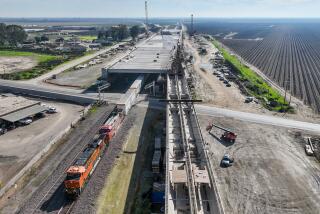COUNTYWIDE : High-Speed Train Needs Public Land
- Share via
A Bechtel Corp. official conceded Wednesday that the company’s proposed magnetically levitated, 300-m.p.h. train from Anaheim to Las Vegas cannot be financed and built privately as planned without the donation of publicly owned rights of way along Interstate 15 in the California and Nevada deserts.
Addressing more than 100 business executives and engineering experts at a luncheon meeting of the Industrial League of Orange County in Costa Mesa, Bechtel Senior Vice President Erv Koenig also said his firm will not do independent ridership feasibility studies--a key to obtaining financial backing--unless Bechtel is awarded an exclusive franchise from the bistate panel studying the project.
Koenig said Bechtel has already committed more than $3 million of its own money to project preparation and won’t spend millions more on additional studies until it knows the money will be recovered.
“It’s a matter of business economics,” he said.
Until now, the only ridership projections have come from a 1989 Canadian Institute of Ground Transport study financed by the city of Las Vegas, which originated the high-speed train proposal. The study projected ridership levels exceeding 5 million passengers annually by the year 2000. Although some experts have strong doubts about the study’s estimates, Koenig said he believes they are too conservative.
Referring to the cost of rights of way, Koenig said after the luncheon that California, Nevada and federal officials are anxious to donate a 50-foot-wide swath of land adjacent to Interstate 15 but that they must await congressional action since current law forbids private use of federal highway land.
The train “simply can’t make a profit without that land,” Koenig said. “If the bill fails to pass for some reason, then this won’t be a private project.”
San Francisco-based Bechtel is one of three firms expected to file formal bids for the project by the July 16 deadline with the California-Nevada Super Speed Ground Transportation Commission, created two years ago to plan and award an exclusive franchise. The final award, expected in September, must be ratified by the legislatures of both states.
The other two firms are Montreal-based Bombardier and Boise-based Morrison-Knudsen. Both are expected to propose French high-speed train technology, which employs steel wheels on steel tracks but at faster speeds than conventional trains.
Bechtel has teamed with the West German Transrapid group, which has developed the mag-lev train at a test track near Emsland.
More to Read
Sign up for Essential California
The most important California stories and recommendations in your inbox every morning.
You may occasionally receive promotional content from the Los Angeles Times.













